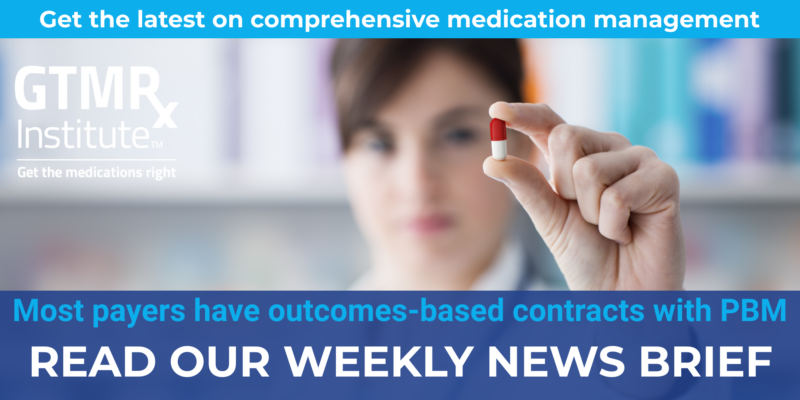Most payers have outcomes-based contracts with PBM
About 58% of payers had at least one outcomes-based drug contract with a PBM in 2022, according to an Avalere Health survey. Of the payers that had at least one outcomes-based contract, over 35% had more than 10. The top therapeutic areas were cardiology and endocrinology. Most (74%) of plans with at least one outcomes-based contract said that they prefer contracts with both claims-based and clinical outcomes. In fact, 53% said they don’t think claims-based outcomes are a good way to measure clinical benefit. (MedCity News; survey)
CMM now the law in North Dakota
North Dakota now requires health insurance companies to include comprehensive medication management services in commercial health benefit plans. A new law expands patient access to CMM and mandates coverage for licensed pharmacists to provide CMM. The Get the Medications Right Institute supported the bill’s passage. “The human and financial toll of getting the medications right is enormous,” Paul Grundy, MD, GTMRx president said. “North Dakota has paved the way for other states to adopt standard CMM criteria and give patients everywhere the comprehensive, coordinated care to get the medications right that they deserve.” (Becker’s Hospital Review; GTMRx announcement)
Practice Transformation
DC news on PBMs, drug price negotiations
Senators drafting legislation to reform PBMs have delayed their effective date, according to STAT. The original date was Jan. 1, 2025, but revised legislation shows that the changes would now take effect no sooner than November 2025. On top of that, procedural differences derailed the Senate Health, Education, Labor and Pensions Committee’s first markup of the legislation. Hearings are expected to resume this week. In other news, CMS plans to publish the final guidance for its Medicare drug price negotiation program in early July. (STAT; KFF Health News; Reuters)
Evidence & Innovation
Report: Cost Plus, RxPass may curb PBM dominance
A special MedPage Today report explores whether ventures such as Mark Cuban’s Cost Plus Drugs and Amazon RxPass will lower prescription costs. They largely target generics, which account for only 10% to 20% of drug spending. They may, however, be chipping away at the market dominance of PBMs. “Companies have seen the distortions that are created by the intermediaries … and they’re saying, ‘We’re going to offer a different model, where we’re transparent about the fees and markups we’re charging, and we’re going to make it a more consumer-friendly experience,'” says Erin Trish, PhD, of USC Schaeffer Center for Health Policy & Economics. (MedPage Today)
Deprescribing trend illuminates need for provider conversations
Americans over 50 are interested in cutting back on prescription medications, according to Michigan Medicine’s National Poll on Healthy Aging. In fact, 80% of adults 50 to 80 would be open to stopping one or more of the prescription medicines they’ve been taking for more than a year if a health care provider said it was possible. Already, 26% said they have done so in the past two years. However, one-third of older adults said they had quit taking a medication they had been using for more than a year without talking first to a doctor, pharmacist or nurse practitioner. More than a third (38%) of those taking five or more prescription medications also said they had stopped taking a medication, compared with 23% of those taking three to four prescription medications and 17% of those taking one to two prescription medications. (IHPI News)
Policy Solutions
Financial hardships impair QoL, but trials don’t capture it
Financial toxicity can impair cancer patients’ quality of life, but clinical trials fail to capture this impact, according to research published in the Journal of Cancer Policy. That’s because trials typically cover the cost of study drugs. “Our work highlights a tension: Clinical trials must protect patients from additional financial difficulties, and at the same time, financial toxicity and QOL data from these trials do not reflect the financial hardship experienced by patients in real-life settings,” the authors wrote. Regulators could, they suggest, demand post-marketing studies to capture this information. (AJMC; Journal of Cancer Policy)
In Case You Missed It!
Learn about the peer-reviewed evidence showcasing the value of CMM, through improvements in access to care, provider work life, outcomes and patient satisfaction as well as a reduction in costs. These findings outline the CMM team-based care process that can be implemented in a variety of health care systems to ensure positive patient outcomes.
Developed by the Evidence-Based Resources Subgroup of the Practice and Care Delivery Transformation Workgroup.
NEW 2022 GTMRx Resource | Comprehensive Medication Management via Telehealth Modality in Team-Based Care:A Review of the Evidence on Quality, Access and Costs, December 2022
Learn about the peer-reviewed evidence showcasing the value of CMM delivered as a service via telehealth and its challenges. Telehealth is a promising modality to improve access to care, facilitate patient monitoring and maintain the needed connection with patients that improves their care and health.
Developed by the Evidence-Based Resources Subgroup of the Practice and Care Delivery Transformation Workgroup.

Join us to be part of meaningful change
Irma, like many others, struggles as a result of our current trial-and-error approach to medication. That is why we advocate for a new, comprehensive approach to medication use and prescribing. As a non-profit 501(c)(3) and 501(c)(4) organization, the GTMRx Institute and Foundation relies on funding from our supporting members. We ask that you consider becoming a Supporting Signing Member so we can continue to provide relevant, timely resources to get the medications right!
If you’re interested in supporting the Institute or Foundation at a higher level, please contact us. Your dollars will bring about meaningful change for people like Irma.




